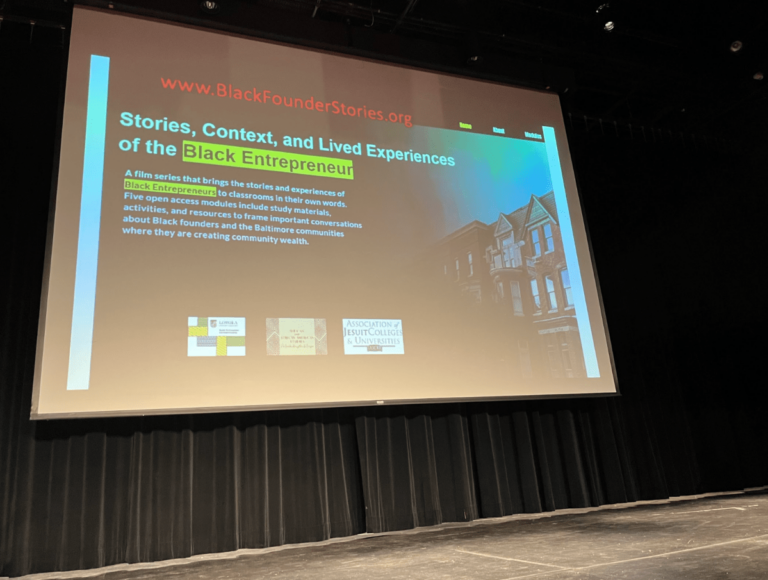
On Monday, Oct. 3, Loyola University Maryland’s McManus Theatre hosted the premiere of the short film series “Stories, Context, and Lived Experiences of the Black Entrepreneur.”
This film series highlights the stories and experiences of five Black entrepreneurs in the Baltimore area whose nonprofits work to benefit marginalized communities in the city. These short films are also part of an online learning module that is open to all. Bill Romani is the Entrepreneur in Residence at Loyola University Maryland and the co-producer of the short film series.
He said, “What we wanted to do was take a holistic view of the history, the sociological, and the political impacts of redlining and how redlining has impacted so many communities in Baltimore, but also to look at the businesses and entrepreneurs that were either coming from those communities or addressing the issues that redlining had caused in those communities.”
Romani and co-producer Dr. Raenita Fenner, chair of the engineering department and director of the African and African American Studies interdisciplinary minor, collaborated on this project to teach students about the intersection of the history of the Black experience and entrepreneurship. They wanted students to learn how these factors can contribute to the work of the Black entrepreneur.
“We’d like them to learn the history and the background that has helped to dictate some of these anti-Black or racist policies that have created these issues in redlined communities, and how important these solutions are that these entrepreneurs are creating,” Romani said.
The film series features five Black entrepreneurs and their businesses: Tyrell Dixon’s Project Own, Ashley Williams’ Clymb, LaQuida Chancey’s Smalltimore Homes, Andrew Suggs’ Live Chair Health, and Shelley Halstead’s Black Women Build. Each short film focuses on each business and their stories. A common denominator amongst these business owners was their personal struggle to gain the funding needed to get their businesses afloat from white investors, as well as their own personal stakes as Black individuals helping the Black community affected by redlining.
“I think there was a connection that I had to build with a very good intention that resonated with the entrepreneurs,” Romani said, “The goal of our video was to be able to address a pain point that they all expressed they were having with their experience with investment and funding, and we’re trying to work with them to address that pain point and be able to teach a new cohort of investors to do it differently.”
Through this film series and accompanying learning module, Romani hopes to break the pattern of slighting qualified Black entrepreneurs by teaching the future of the business world to be more equitable.
“We would like to have our students be empathetic to that funding experience that they go through, and to be able to create this new cohort of investors that is not only concerned about working with black and women entrepreneurs, to prepare them to invest in the way the investment process and institutions work today, but to consider how we might do the work, as Ashley Williams has implored, to be able to reach out and create new ways of investing that include the entrepreneurs and the communities that they come from, so that we create a more equitable way for them to get the funding to do the great community work that they’re doing,” says Romani.
To access the film series and learning module, visit BlackFounderStories.org.
Featured Image Courtesy of Katie Roessel